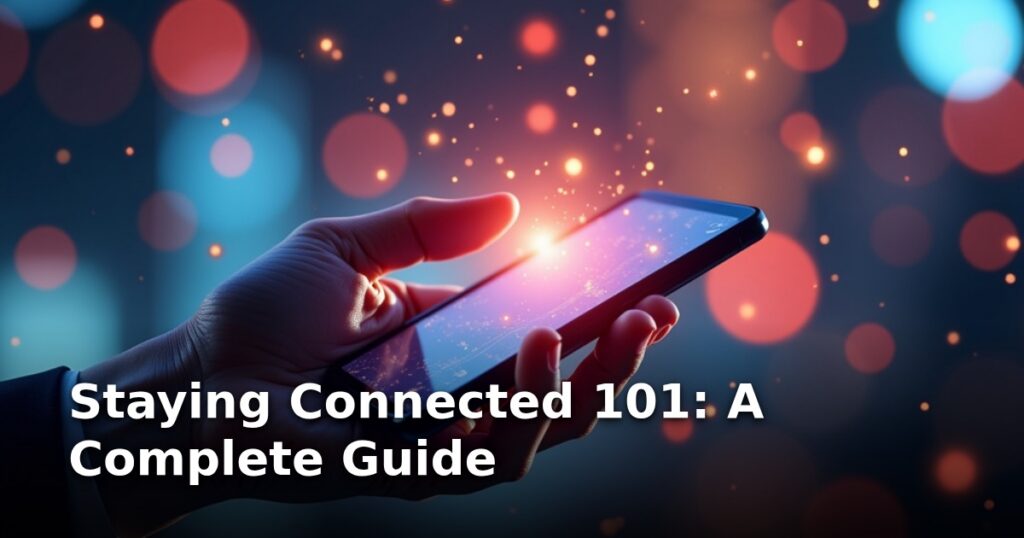Staying Connected 101: A Complete Guide
Welcome to Staying Connected 101! Whether you are navigating the complexities of a long-term partnership, looking to revitalize a relationship after a busy season, or planning for a fresh start, this guide is designed for you. Building and maintaining strong connections doesn't require advanced degrees in psychology; it simply requires consistent, mindful effort. This beginner's guide will break down the fundamentals of relational health, offering actionable steps you can implement immediately to foster deeper bonds with the people who matter most.
Understanding Connection: What It Means to Stay Connected
At its core, staying connected means actively nurturing the emotional, mental, and physical ties within a relationship. Think of your relationship like a garden. If you plant the seeds (the initial relationship), you must consistently water, weed, and provide sunlight (attention and care) for it to flourish. If you stop tending to it, even the strongest roots will weaken over time.
This guide will cover practical strategies, from improving daily interactions to holiday relationship advice that helps you manage increased pressure points. We aim to provide you with the foundational tools necessary to feel confident in your relational skills.
Why Connection Matters for Beginners
Many people assume that if a relationship is "good," it will take care of itself. Unfortunately, this is rarely the case. Investing in your relationships yields significant returns, boosting overall happiness and resilience.
For beginners, understanding the importance of proactive connection prevents small issues from escalating into major conflicts. When you are actively connected, you create a buffer against external stressors, such as demanding careers or family obligations. Furthermore, learning these skills now sets a positive precedent for all future interactions, whether romantic or platonic.
Essential Terminology Explained
To discuss connection effectively, let’s clarify a few key concepts you will encounter:

- Emotional Intimacy: This is the feeling of being truly seen and understood by another person. It’s about sharing your inner world—fears, dreams, and vulnerabilities—with trust.
- Active Listening: This goes beyond just hearing words. It means paying full attention, nodding, maintaining eye contact, and summarizing what the other person said to ensure you understood their message correctly.
- Validation: This means acknowledging and accepting another person's feelings as real and understandable, even if you don't personally agree with their perspective. For example, saying, "I can see why that situation made you feel frustrated."
- Bids for Connection: These are small attempts by one person to get attention, affirmation, affection, or any positive connection from the other. A bid might be a simple question ("What are you thinking about?") or a sigh. Recognizing and responding positively to these bids is crucial for effective communication in marriage and partnerships.
Getting Started: Your First Steps to Deeper Connection
You don't need grand gestures to start improving your connections. The most powerful changes happen in the small, consistent moments. Here are three foundational steps to begin today:
1. Implement the "Five-Minute Check-In"
Dedicate five minutes every day—perhaps over coffee or right before bed—where devices are put away, and the sole focus is on the other person.
- Ask Open-Ended Questions: Instead of "How was your day?" try "What was the most surprising thing that happened today?" or "What challenged you the most?"
- Practice Active Listening: Focus purely on receiving their story without planning your response.
2. Master Non-Verbal Communication
Your body language often speaks louder than your words. When interacting, ensure your posture is open (uncrossed arms), and you are facing the person. Eye contact signals respect and engagement. This is particularly important when staying connected during stressful work periods, as non-verbal reassurance can be very grounding.
3. Schedule Connection Time
Life gets busy, and relationships can easily be sidelined by deadlines. Treat your connection time like an important meeting that cannot be missed. This could be a weekly date night or even just blocking out an hour on Sunday for planning the week together.

Navigating Common Sticking Points
As you begin prioritizing connection, you might run into predictable hurdles. Understanding these challenges beforehand makes them easier to manage.
Recognizing Distance: Signs Your Partner is Pulling Away
Sometimes, a lack of connection isn't immediately obvious until it becomes significant. Learning the signs your partner is pulling away allows you to intervene early. Look out for:
- Increased irritability or defensiveness during minor discussions.
- A noticeable drop in shared activities or inside jokes.
- Less initiation of physical touch or intimacy.
- More time spent engaging in solitary hobbies without sharing the experience.
If you notice these signs, approach the situation gently, using "I" statements (e.g., "I’ve noticed we haven’t talked much lately, and I miss connecting with you") rather than accusatory "You" statements.
Handling External Pressures: Managing In-Law Relationship Stress
External relationships, especially family dynamics, can put immense strain on a partnership. When managing in-law relationship stress, remember that your primary allegiance is to your core relationship.
- Create United Fronts: Discuss boundaries privately before interacting with extended family.
- Validate Your Partner: Acknowledge their feelings about difficult family members, even if you don't share the exact experience.
Preparing for High-Stress Seasons

Holidays, tax season, or major work projects can severely test your relational bandwidth. When you know a period of high demand is coming, communicate proactively about managing expectations. This is key for successful holiday relationship advice—don't assume your partner knows you are overwhelmed; state it clearly and plan for less quality time temporarily, making up for it later.
Common Beginner Mistakes to Avoid
Even with the best intentions, beginners often fall into traps that unintentionally sabotage connection:
- Solving vs. Hearing: When a partner shares a problem, the immediate instinct is often to offer a solution. Resist this urge initially. Most of the time, people just want to feel heard. Ask first: "Are you looking for advice, or do you just need me to listen right now?"
- Assuming Intent: Never assume you know why your partner did something. If their action hurt you, ask them about their intent rather than jumping to the conclusion that they meant to cause harm.
- Forgetting the Fun: Focusing too much on deep talks or problem-solving can lead to burnout. Ensure you are still having lighthearted, enjoyable interactions. If you are looking ahead, remember that applying these principles is excellent dating advice for the new year—schedule fun, low-stakes activities to build positive shared memories.
Next Steps for Continued Growth
Mastering connection is a lifelong journey, not a destination. Once you feel comfortable with the basics, consider these next steps:
- Learn Conflict Resolution: Every relationship has conflict. Learning how to argue fairly—focusing on the issue, not attacking the person—is the next vital skill.
- Schedule Reflection Time: Once a month, review your check-ins. What worked well? Where did you both feel distant? Adjust your strategies based on this feedback.
- Seek Resources: Read books or take short online courses focused on effective communication in marriage or partnership skills. Professional guidance, such as couples counseling, is not a sign of failure but a proactive investment in future success.
Conclusion: Building a Resilient Connection
Staying connected is an ongoing practice of showing up for the people you care about. It involves vulnerability, patience, and a willingness to learn from missteps. By focusing on active listening, validating emotions, and consistently carving out time for one another, you are building a resilient foundation capable of weathering any storm—whether it’s managing in-law relationship stress or simply getting through a tough week. Start small today, be kind to yourself and your partner during the learning process, and watch your connections deepen and strengthen.



